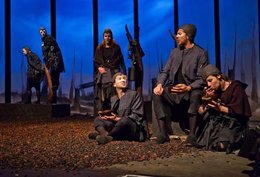You can learn something new every day. ‘Murder’ is the collective noun for a significant number of crows, and there is an abundance of crows associated with death and decomposition: Shakespeare filled Macbeth with carrion as sinister harbingers of fatality; Ted Hughes took his Crow to the extremes of nihilism and obscenity, the antithesis of godliness “screaming for Blood/Grubs, crusts/Anything.” The crows in Barnstorm’s take on 'Hansel and Gretel' may not go as far as Hughes’ monstrous creation, but, by hovering over the action as  chorus (led by Shane O’Reilly), dressed in fluttering black costumes of indeterminate shape that imply, rather than state, the essence of ‘crowness’, they set the dark tone of the story. Their constant presence, perched in an intimidating line, cawing or erupting into a scary whirl of activity, creates a pervasive, repetitive sense of dread.
chorus (led by Shane O’Reilly), dressed in fluttering black costumes of indeterminate shape that imply, rather than state, the essence of ‘crowness’, they set the dark tone of the story. Their constant presence, perched in an intimidating line, cawing or erupting into a scary whirl of activity, creates a pervasive, repetitive sense of dread.
In such a malevolent environment, the exercise of self-will is difficult. The youthful protagonists (Paul Curley and Sarah Kinlen) struggle in a fairy-tale environment of deep, deep forest. The central theme is hard times and, while they achieve a qualified form of independence through decisive actions, they never quite elude the unsettling darkness that is beautifully conveyed by Carol Beteras’s sombre setting, with changing moods flagged by Mark Gallione’s variegated lighting.
Mike Kenny’s text, the culmination of work with the ‘devising company’, is a harsh choral soundscape of words. It unearths some serious and subtle themes, challenging to a young audience and rewarding for the adults with its layers of historical allusion. These are “hard times”; the context of the story is a land racked with famine, with words and images referencing Ireland’s ‘holocaust’: “The only things that grew were troubles.” “In hard times children are a luxury.” The children fade to ”skin and bone.” The savage indignation of Swift’s .jpg.aspx%3Fwidth=260&height=170) Modest Proposal surfaces as the boy is plumped up for the old woman’s delectation: “People don’t do those things – not to children!” Ultimately the boy’s fate is the emigrant boat, rather than the cauldron, as he joins the emigrant throngs heading for the sea.
Modest Proposal surfaces as the boy is plumped up for the old woman’s delectation: “People don’t do those things – not to children!” Ultimately the boy’s fate is the emigrant boat, rather than the cauldron, as he joins the emigrant throngs heading for the sea.
The play takes on family break-up, with the death of a parent and the arrival of a step-mother (Annette Flynn) and the production avoids cliché. When she and her husband (Conor Donelan) are heard discussing provision for their unborn baby by abandoning the older children, this is presented as a moral dilemma prompted by severe conditions, rather than a villainous act of cruelty. While the old woman (Fiona McGeown) sails close to pantomime witch, she is driven by desperation and hunger: “I’ll feed it and I’ll kill it.” It’s a bleak world where there are “No excuses only reasons.”
Apart from some unnecessary anodyne music, with A Murder of Crows, directed by Philip Hardy, Barnstorm has achieved a combined strength through its small ensemble, reflected in the harmonies of their speech, the fluidity of the movement and their capacity to segue smoothly into doubling as both the crows and the human protagonists. A Murder of Crows is rooted in story-telling, but it upends the form in a satisfying manner.
Derek West